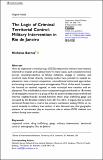Files in this item
The logic of criminal territorial control : military intervention in Rio de Janeiro
Item metadata
| dc.contributor.author | Barnes, Nicholas | |
| dc.date.accessioned | 2021-08-24T16:30:10Z | |
| dc.date.available | 2021-08-24T16:30:10Z | |
| dc.date.issued | 2022-04-01 | |
| dc.identifier | 275119259 | |
| dc.identifier | 3b0f4a45-bdaa-496d-b00c-4d3f182c54fa | |
| dc.identifier | 85112717139 | |
| dc.identifier | 000685830900001 | |
| dc.identifier.citation | Barnes , N 2022 , ' The logic of criminal territorial control : military intervention in Rio de Janeiro ' , Comparative Political Studies , vol. 55 , no. 5 , pp. 789-831 . https://doi.org/10.1177/00104140211036035 | en |
| dc.identifier.issn | 0010-4140 | |
| dc.identifier.other | ORCID: /0000-0001-9559-6676/work/99116340 | |
| dc.identifier.uri | https://hdl.handle.net/10023/23825 | |
| dc.description | The fieldwork on which this article is based received generous funding from the Social Science Research Council, the National Science Foundation, and the U.S. Department of Education Fulbright Program. | en |
| dc.description.abstract | How do organized criminal groups (OCGs) respond to military interventions intended to weaken and subdue them? In many cases, such crackdowns have proven counterproductive as OCGs militarize, engage in violence, and confront state forces directly. Existing studies have pointed to several explanations: inter-criminal competition, unconditional militarized approaches, and existing criminal governance arrangements. Much of this work, however, has focused on national, regional, or even municipal level variation and explanations. This article takes a micro-comparative approach based on 18 months of ethnographic research in a group of Rio de Janeiro favelas (impoverished and informal neighborhoods) divided between three drug trafficking gangs and occupied by the Brazilian military from 2014 to 2015. It argues that an active territorial threat from a rival is the primary mechanism leading OCGs to respond violently to military intervention. It also demonstrates that geographic patterns of recruitment play an important role in where OCG rivalries turn violent during intervention. | |
| dc.format.extent | 43 | |
| dc.format.extent | 2540300 | |
| dc.language.iso | eng | |
| dc.relation.ispartof | Comparative Political Studies | en |
| dc.subject | Organized crime | en |
| dc.subject | Drug trafficking | en |
| dc.subject | Gangs | en |
| dc.subject | Military intervention | en |
| dc.subject | Territorial control | en |
| dc.subject | Ethnography | en |
| dc.subject | Rio de Janeiro | en |
| dc.subject | JZ International relations | en |
| dc.subject | E-NDAS | en |
| dc.subject | SDG 11 - Sustainable Cities and Communities | en |
| dc.subject | SDG 16 - Peace, Justice and Strong Institutions | en |
| dc.subject.lcc | JZ | en |
| dc.title | The logic of criminal territorial control : military intervention in Rio de Janeiro | en |
| dc.type | Journal article | en |
| dc.contributor.institution | University of St Andrews. School of International Relations | en |
| dc.identifier.doi | https://doi.org/10.1177/00104140211036035 | |
| dc.description.status | Peer reviewed | en |
| dc.identifier.url | https://journals.sagepub.com/doi/suppl/10.1177/00104140211036035 | en |
This item appears in the following Collection(s)
Items in the St Andrews Research Repository are protected by copyright, with all rights reserved, unless otherwise indicated.

